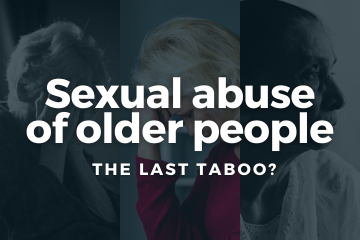
Sexual violence and abuse is a heinous crime that transcends age and gender. Like many other forms of abuse committed against older people, it is not often talked about in wider society. However, the impact is devastating for the victim-survivor.
The definition of sexual abuse is any non-consensual sexual act or activity perpetrated against an older person. This includes rape, sexual assault, coercing an older person into making or viewing explicit imagery, indecent exposure, inappropriate sexual harassment, teasing, innuendo, or non-consensual masturbation.
According to Hourglass data, calls to our 24/7 Helpline pertaining to sexual abuse constitute around 2-3% of cases. However, this is most likely just the tip of the iceberg. Rape Crisis UK reports that 5 in 6 women who are raped don’t report it, with the same being true for 4 in 5 men. The charity cites reasons such as ‘embarrassment’, ‘humiliation’ and a lack of trust in the police to help as reasons for not reporting their assault. These reasons are eerily similar to the reasons why many older victim-survivors of all forms of abuse feel unable to report their experiences.
In the case of sexual abuse against older people, research is extremely limited. From research papers by Dr Hannah Bows and Amanda Warburton-Wynn we know that the majority of older victims of sexual abuse are female and the majority of perpetrators are male.
In addition, most perpetrators are known to the victim, either being an acquaintance, partner or spouse. This is in contrast to the few media depictions of the sexual abuse of older people, in which cases of sexual abuse committed in care homes by strangers are reported more frequently.
This echoes the general trend in the abuse of older people, in which despite the majority of victims experiencing abuse in their own homes committed by family members and friends, the stories of stranger abuse are more likely to feature in the media.
Here we have three cases of sexual violence and abuse which were referred to the Hourglass Community Response service.
Story 1 – Sandra
Sandra was referred to Hourglass after experiencing sexual assaults from a neighbour over the course of 3 months. Her husband passed away during the Covid pandemic and a neighbour stepped in to offer support, both practical and emotional. He made sexual advances towards her in her own home, to which Sandra’s trauma response was to freeze.
Sandra is dealing with a lot of self-blame for not trying to stop the perpetrator and also not disclosing this was occurring until 3 months after it had started. Sandra felt it was her fault and there were many discussions around trauma responses to try and alleviate these feelings. Sandra discussed feeling ‘unclean’ and that she had showered many times, even months after the fact, but this never helped.
Story 2 – Deborah
Deborah started a new relationship with a man who lived in the same supported living facility. This started as them going on dates and they later formed a relationship. He then began to tell Deborah about his high sex drive and how he needs to be sexually satisfied in a relationship. Initially their sexual encounters were consensual, however during one situation he became very forceful and she asked him to stop.
He did not, and she felt too weak to fight him off. Deborah was left with bruises, to which the perpetrator stated ‘you would bruise if you knocked against a feather’. She was left feeling as though the situation was her fault, and that it had not been a rape because it began as a consensual encounter. We had discussions around how consent can be withdrawn at any time, as Deborah was unaware you could withdraw consent if you had consented initially.
Deborah was also very nervous about making a disclosure of sexual abuse, it was not referenced on the initial referral received by Hourglass, however it was later disclosed when the DASH risk assessment was completed. She stated she had not disclosed this beforehand, as she felt nervous to discuss someone of her age being sexually active – commenting on how society assumes this stops after a certain age.
Story 3 – Catherine
Catherine was experiencing love-bombing from a friend who was at her local tennis club. Her health was declining and he was offering both emotional and practical support which she was grateful for, as she has no family. She described this as a ‘whirlwind romance’. They got engaged after a few months, and when they married she described that he immediately changed. On our initial call, Catherine disclosed coercive control, physical and psychological abuse, and a further call was set up to complete a DASH risk assessment.
On starting that call, Catherine stated she wanted to disclose something further before the risk assessment started. At this point, Catherine disclosed multiple situations of rape and sexual assault over the course of the relationship. She stated there had been several incidents where she initially consented to sex, however he would then move her into very uncomfortable positions and she would say this hurt and asked him to stop, he would then hold her down and continue.
Catherine then discussed how she wasn’t sure this would qualify as rape as she initially consented to sex, and there were further discussions on how consent can be withdrawn at any time. Catherine then discussed how she should have kept more up to date with legislation, as to her knowledge when married there could not be rape in a relationship as when she was younger this was the law. Catherine dealt with a lot of self-blame and felt she should have done more to stop him. We discussed trauma responses and she reported this conversation helped her to understand why she reacted how she did at the time.
 Shop Now
Shop Now